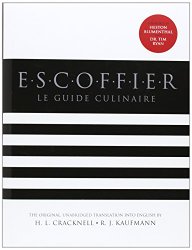$70.00
$39.49
(SAVE Now!)
as of 12/22/2024 (Details)
The culinary bible that first codified French cuisine—now in an updated English translation with Forewords from Chefs Heston Blumenthal and Tim RyanWhen Georges Auguste Escoffier published the first edition of Le Guide Culinaire in 1903, it instantly became the must-have resource for understanding and preparing French cuisine. More than a century later, it remains the classic reference for professional chefs. This book is the only completely authentic, unabridged English translation of Escoffier’s classic work. Translated from the 1921 Fourth Edition, this revision includes all-new Forewords by Heston Blumenthal, chef-owner of the Michelin three-star-rated Fat Duck restaurant, and Chef Tim Ryan, President of The Culinary Institute of America, along with Escoffier’s original Forewords, a memoir of the great chef by his grandson Pierre, and more than 5,000 narrative recipes for all the staples of French cuisine.• Includes more than 5,000 recipes in narrative form for everything from sauces, soups, garnishes, and hors d’oeuvres to fish, meats, poultry, and desserts• Ideal for professional chefs, culinary students, serious home cooks, food history buffs, and unrepentant foodies• The only unabridged English translation of Escoffier’s original text, in a sleek, modern designFor anyone who is serious about French food, modern cooking, or culinary history, Escoffier’s Complete Guide to the Art of Modern Cookery is the ultimate guide and cookbook. Sample Recipes: Oefs Benedictine and Mousses and Mousselines Oeufs Bénédictine Poached or Soft boiled: Cover the bottom of tartlet cases with a Brandade of salt cod (see below) mixed with a little chopped truffle. Place the eggs which have been coated with Sauce Crème on top. Brandade de Morue Cut the fish into large square pieces and poach for only 8 minutes from the time it comes back to the boil so as to keep it slightly undercooked. Immediately drain and remove all skin and bones. Place 2 ½ dl (9 fl oz or 1 1/8 U.S. cups) oil in a shallow pan and heat until just smoking; place in the fish with 1 clove of crushed garlic and using a wooden spatula, mix vigorously over the heat until the fish becomes a fairly fine paste. Remove from the heat and add 5-6 dl (18 fl oz – 1 pt or 2 ¼ - 2 5/8 U.S. cups) oil, a little at a time mixing continuously with a spatula. Adjust the consistency of the paste from time to time with 2-3 tbs boiling milk until a maximum of 2 ½ dl (9 fl oz-1 1/8 U.S. cups) milk has been absorbed. When the Brandade mixture is finished it should be very white and have the consistency of mashed potato. Finally adjust the seasoning and arrange pyramid shape in a deep dish then decorate with small triangles of bread which have been freshly fried in clarified butter. Cold Mousses, Mousselines and Soufflés The terms Mousses and Mousselines can be used to describe hot and cold preparations; that which differentiates between Mousse and Mousseline is not the composition but its moulding. A Mousse, hot or cold, is made in a large mould of which the size is generally sufficient for more than one person. The Mousselines are moulded either with spoons, a piping bag, or in special moulds having the form of large Quenelles, and one only is served per person. The Soufflés are moulded in small cassolettes or soufflé moulds. Composition of the Mixture for Cold Mousses and Mouselines Ingredients: 1 litre (1 ¾ pt or 4 ½ U.S. cups) cooked purée of the principal ingredient such as chicken, game, fois gras, fish or shellfish 2 ½ dl (9 fl oz or 1 1/8 U.S. cups) melted aspic jelly 4 dl (14 fl oz or 1 ¾ U.S. cups) appropriate Velouté 4 dl (14 fl oz or 1 ¾ U.S. cups) double cream which being correctly whipped will be equal to 6 dl (1 pt or 2 5/8 cups) The proportions of the above ingredients may be slightly adjusted according to the nature of the main ingredients being used and in the preparation of certain Mousses either jelly by itself or Velouté alone need to be used. Method: Add the cool jelly and Velouté (or just one of these ingredients if called for) to the basic purée and mix together on ice. When cold and thicker in consistency, add and fold in the cream. Seasoning is very important in cold preparations and it should always be checked and adjusted with great care. Note: the cream should not be more than half whipped, if it is fully whipped the quality of the Mousse will be less delicate and of a dryer texture. Moulding of Cold Mousselines This can be carried out in two different ways, by either simply lining the mould with jelly or afterwards coating with a Sauce Chaud-froid. In either case, they should be made in oval moulds of the type used in the making of large Quenelles or Mousseline eggs. Method 1: Line the moulds with very clear aspic jelly and cover with a layer of the Mousseline mixture; garnish the center with a Salipicon composed of the same basic ingredient as that in the Mousse, e.g. poultry, game, shellfish, etc. and of truffle. Cover with more Mousseline mixture; smooth dome-shape and place in the refrigerator to set. Method 2: Place a layer of the mixture in the bottom of the moulds, garnish the centre with a Salipicon, cover with more mixture and place to set. After demoulding, coat the Mousselines with Sauce Chaud-froid in keeping with the composition of the mixture; decorate with truffle and other items in keeping with the Mousseline and glaze with aspic jelly to fix the decorations. Set a layer of very clear aspic jelly in the bottom of a silver or glass dish and arrange the Mousselines on top; coat them once more with jelly and keep in the refrigerator until required. Garden Party
Technical Details
No features available.